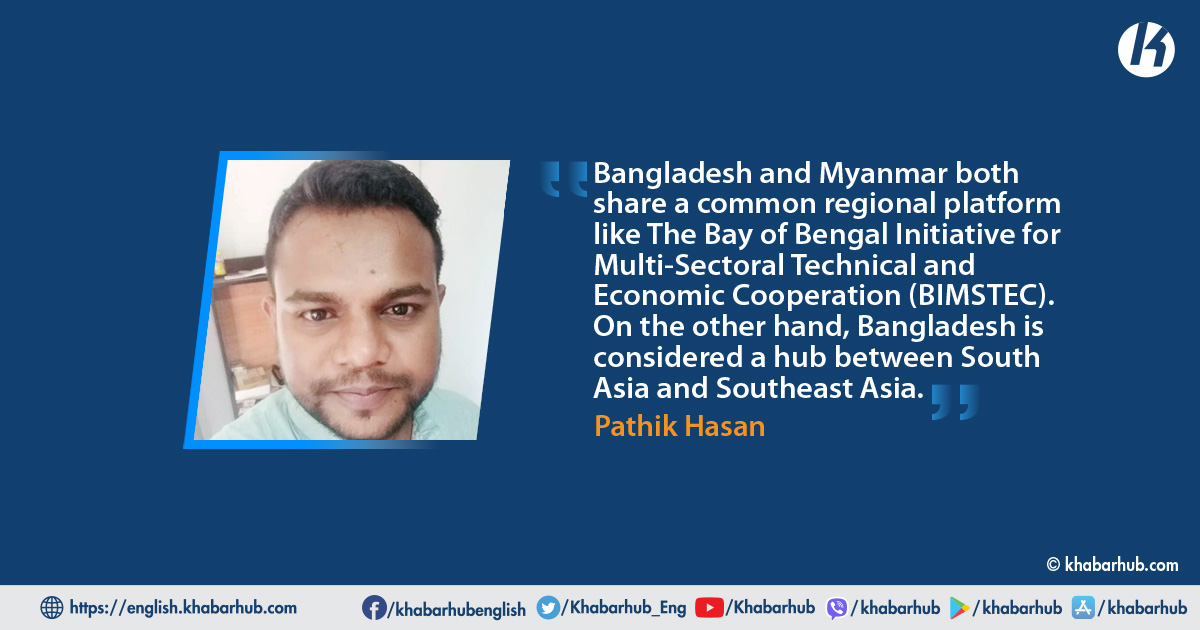Myanmar is one of the closest neighbors of Bangladesh. Before World War II, many people from Bangladesh used to travel to Myanmar (Burma then) in search of livelihood.
Since then, the people of this country have developed an economic and social relationship with Burma. Apart from India, Bangladesh shares a border with Myanmar.
The 271km-long Bangladesh-Myanmar border is very important for Bangladesh due to geographical reasons.
Bangladesh can use Myanmar by land for communication with Southeast Asian countries including China.
Road connectivity is possible through Myanmar, perhaps a new horizon of relationships and possibilities unfolds.
Myanmar can also use Bangladesh to reach South Asia, especially Nepal, Bhutan and India.
Bangladesh and Myanmar both share a common regional platform like The Bay of Bengal Initiative for Multi-Sectoral Technical and Economic Cooperation (BIMSTEC).On the other hand, Bangladesh is considered a hub between South Asia and Southeast Asia.
It is true that Bangladesh is a Southeast Asian country geographically but a South Asian country culturally, demographically and historically. This is an outstanding geo-strategic characteristic of Bangladesh.
While attracting foreign investment has been limited to the oil and gas sector, the country has recently shifted its focus to attracting production-based investment.
Therefore, without the involvement of Bangladesh, any connectivity among the states of ASEAN and the South Asian Association for Regional Cooperation is absolutely impossible. Myanmar is a country rich in natural resources.
There are huge amounts of natural resources like tin, zinc, copper, tungsten, coal, marble, limestone, natural gas, hydropower, etc.
The major resource of this country is mineral resources and Myanmar can be a major source of energy for Bangladesh to ensure its energy security. Food and grains are produced in large quantities in Myanmar and they can also be big support for Bangladesh in the field of food security.
The country has a huge potential for rice cultivation, but lands there have not been utilized for decades due to the lack of human resources.
Myanmar needs laborers as rice production in Myanmar accounts for approximately 43% of total agricultural production in the country, making it the seventh-largest producer of rice in the world.
Out of 67.6 million hectares of land, 12.8 million are used for cultivation. In 2019 alone, Myanmar accounted for 13,300 million tons of milled rice production.
Rice production in Myanmar is heavily dependent on human and animal power, both traditional methods of cultivation. However, it lacks manpower and technology in this regard.
But Bangladesh has these two things. It has a surplus of human resources and Myanmar can utilize it for maximum gain.
But Bangladesh has never been able to take full advantage of this opportunity as the country, comprising 135 tribes and different ethnic groups, has been under military rule for many years.
That may be one of the reasons why the relationship between Bangladesh and Myanmar is not deep.
If Bangladesh had good relations with Myanmar, its dependence on India could be reduced in many cases and if contacts were made in Southeast Asia and China through Myanmar, there would be immense potential for investment and trade.
Bangladesh and Myanmar are both on the way to becoming developed countries.
Bangladesh is going to be a South Asian Economic Miracle, playing a significant role in Myanmar and to some extent all of Southeast Asia.
For this, Myanmar should increase its diplomatic relations with Bangladesh for better mutual interest for all of South Asia and Southeast Asia.
The European Union, China, India, Russia and North Korea are becoming allies in Myanmar’s oil, gas, mineral resources and military markets.
Taking advantage of US negligence, Myanmar’s military junta extended a helping hand to China for investment purposes.
China is now the biggest investor in this country. According to Earth-Rights International, a private group, more than 26 Chinese companies are investing in Myanmar’s oil, gas, mineral resources and allied sectors.
China has already become its biggest ally in building and supplying arms to Myanmar. Myanmar has not only developed relations with China but also with India and both countries are building trade relations with Myanmar.
The US is also changing its approach to the Myanmar question, which is why the US, a strong economic country, has started taking new initiatives to develop relations.
Recently, a 41-year dispute over the maritime border between Bangladesh and Myanmar had been settled by the International Court of Justice.
The proposed construction of the Asian Highway, funded by the Asian Development Bank and other donor groups, could also increase land connectivity between the two countries and there is ample opportunity to increase shipping.
As a result, the rights of Bangladesh have been established in an area of 11,000 square kilometers. Myanmar’s waters have also been identified and as a result, this problem has been eliminated.
The path of creating tension in the Bay of Bengal has been blocked. Myanmar is rich in minerals, ores, oil, gas, precious stones and other natural resources and it is a major supplier of wood to the world.
While attracting foreign investment has been limited to the oil and gas sector, the country has recently shifted its focus to attracting production-based investment.
The country is well ahead in power generation due to sound investments in hydropower generation. The tourism industry is also a promising sector of the country.
Myanmar’s economy has so far been limited to extracting natural resources, said Nobel laureate economist Professor Joseph Stiglitz, who warned that the country would suffer a “curse of wealth” if it continued.
Some resource-rich countries in Africa, including Nigeria, Sudan and Benin, have been plagued by corruption, internal strife and poverty.
These countries could not adopt a proper wealth management system and economists have opined that if democracy is restored in Myanmar and corruption is reduced, it will not have to go to the level of countries that have failed in wealth management.
Therefore, it can be assumed that Myanmar will become a country with rapid economic growth in a few years. The country’s biggest economic advantage is that it is a member of the 10-nation ASEAN.
ASEAN is one of the three most successful trade blocs in the world consisting of Singapore, Malaysia, Indonesia, Thailand, the Philippines, Brunei, Vietnam, Cambodia, Laos and Myanmar.
The bloc controls about 24% of total world trade and its share in world trade are growing every year and its trade relations with China, Japan and South Korea are deepening due to the increase in trade.
ASEAN countries account for more than 50% of total trade among themselves and the three countries. As a result, Bangladesh has the opportunity to benefit by strengthening ties with this trade alliance, that is, Myanmar.
Both countries are among the seven-member countries of BIMSTEC, as such, there is ample opportunity to increase trade and investment relations between them through the initiative.
There are many opportunities to enhance Bangladesh’s bilateral trade and investment relations with Myanmar. Through the import of gas and electricity, Bangladesh can obtain future energy security.
However, the two countries can also increase productivity in the agricultural sector through joint ventures. Apart from adopting joint investment projects, Bangladesh can increase imports of various agricultural products including pulses, spices, fish and rice.
The two countries can jointly explore oil and gas in the Bay of Bengal and Bangladesh can also contribute to the development of Myanmar’s infrastructure.
The proposed construction of the Asian Highway, funded by the Asian Development Bank and other donor groups, could also increase land connectivity between the two countries and there is ample opportunity to increase shipping.
Furthermore, joint investments can be made in the production of fertilizer, plastic, cement and furniture.
Both countries will benefit if Myanmar produces raw materials and Bangladesh utilizes its skills, technical knowledge and labour. Myanmar imports almost every product while Bangladesh can export ready-made garments.
Bangladesh produces medicines, electronics. Myanmar can import these from Bangladesh hugely. On the other hand, Myanmar is a source of agricultural products. Bangladesh can import these from Myanmar.
During the moment of Bangladesh’s onion crisis with India in 2019, Myanmar provided onions to Bangladesh. Bangladesh understood the importance of bilateral trade with Myanmar at that time.
On the flip side, Bangladesh is keen to provide assistance to Myanmar, with Covid-19 vaccine diplomacy, counter-terrorism approach for regional security in some sectors.
However, the Rohingya refugee problem has caused a rift between Bangladesh and Myanmar.
As such, Myanmar should solve this problem to serve its own and regional interests. The country should understand that it is an issue in South Asia and Southeast Asia could become volatile and unstable because of it.
However, the two countries can also increase productivity in the agricultural sector through joint ventures. Apart from adopting joint investment projects, Bangladesh can increase imports of various agricultural products including pulses, spices, fish and rice.
Thus, enhancing bilateral relations could contribute to the growth of trade and investment relations with ASEAN and BIMSTEC countries.
This will create an opportunity to solve the Rohingya problem and stop militant activities. They have to engage sooner than later to find a political solution and restore sanity and human dignity.
Therefore, Myanmar and Bangladesh should take effective steps to strengthen bilateral relations.









Comment